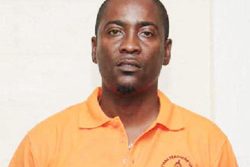Despite having few resources to prevent the novel coronavirus disease (COVID-19) from taking hold in their community, residents of Masakenari, Region Nine, are ensuring that no one crosses over to their side of the Guyana/Brazil border.
Masakenari is one of several indigenous communities located close to the Guyana/Brazil border in the Upper Takutu/Upper Essequibo region. The location of their community brings them closer to the Brazilian state of the Amazonas, which currently has 31,949 confirmed cases inclusive of 1,852, deaths as of yesterday. The state of Amazonas has the fourth highest number of confirmed cases of the coronavirus in Brazil, which now has the second highest number of cases of coronavirus in the world.
The Toshao of the Wai-Wai populated community, Paul Chekema told Stabroek News yesterday that the residents are aware of the coronavirus threat they are facing especially from Brazil. He explained that Masakenari is basically isolated from the rest of Guyana and it takes residents at least six days to travel from the village to Aishalton. Given the location of the community, he said, they would rarely see any strangers from other parts of the country in their community. Normally, he added, persons would go into the community to hold religious gatherings but since Guyana confirmed its first case of coronavirus, no one has visited the community.
However, the same cannot be said for Brazilian miners, who sometimes illegally cross that part of the Guyana/Brazil border to gain access to the Marudi mining area and the community of Parabara, where persons allegedly take part in illegal mining.
Chekema said that since becoming aware that Brazil poses a major threat to his residents’ well-being especially since they are closer to the state of Amazonas than any other community in Guyana, he has dispatched several residents to patrol the border lines, which are located just a few miles away from the community.
Thus far, he said they have denied entry to several persons but given the limited number of people patrolling the area, he is not sure whether any have entered the county without their knowledge but he is certain that no one has entered Masakenari since those measures have been put in place.
“Nobody from Brazil have come into our village as yet. We have a couple of rangers patrolling areas [close to the] Brazilian border and we are telling them [Brazilians] not to come in our country,” Chekema said.
A few days ago, torrential rains in the area caused the Essequibo River to overflow its banks leaving dozens of farms underwater. When the residents realised what was happening, they rushed to salvage whatever crops they could but due to the intensity of the rain they were forced to retreat to their homes to seek shelter until it subsided.
When the rain stopped, the residents went into their farms to reap their crops and discovered that almost all were destroyed, leaving the community without food supplies. The toshao appealed for support, which was subsequently tendered by the Ministry of Indigenous Peoples Affairs (MoIPA) and the Civil Defence Commission (CDC).
Yesterday, Chekema again expressed his thanks on behalf of the residents of the community to both the MoIPA and CDC. “I want to say on behalf of my community, thanks so much to the ministry and CDC for their quick response. For now, we are ok with food stuff,” he stated, before cautioning that although the rains have eased for now, heavier showers are expected in June.
Chekema emphasised that one of the main reasons why they are particularly vigilant in keeping Brazilians out of their area of the country is because the community lacks the basic resources to help them prevent the spread of the virus.
“We are ok so far with foodstuff but we do have needs like soaps and those other cleaning stuff. No Colgates [toothpaste]. The rangers don’t even have batteries for their torch lights. We don’t have those so we don’t know how to help them. I am only saying this because nobody has been able to go shopping because of the sickness [COVID-19] and I don’t know how to get these things,” the Toshao lamented.
When asked by Stabroek News if he told the MoIPA and the CDC about that, Chekema said, “yes we did, we told the ministry but when the CDC came we did not see any, only we see foodstuff.”
Chekema added that without the necessary resources, the only option they have is to do their best in monitoring the Guyana/Brazil border even if it eventually proves futile.






